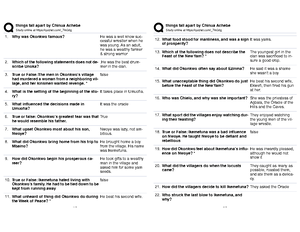- Information
- AI Chat
Was this document helpful?
Asocena - Short story
Course: Literature (L00001)
62 Documents
Students shared 62 documents in this course
University: Ateneo de Zamboanga University
Was this document helpful?

1
May Temple-Maravilles. Literatures of Mindanao. Languages Department. School of Liiberal Arts. Ateneo de Zamboanga University
ASOCENA
By Antonio Enriquez
Like most of the boys in Labuan, a coastal barrio in Zamboanga, Chu had a farm dog. He called him
Leal, which in the Chabacano dialect means loyal. It was always fun to watch Leal chase the big
monkeys in the cornfield, for as the dog passed under the low branches of the trees on the slope of a
small hill above the kaingin, the monkeys hanging by their tails from the low branches would reach
out and pull Leal’s tail. This always enraged the dog and he would bark at the foot of the hill until
the monkeys, bored, left for higher branches. Chu could not think of anything funnier happening to
a farm dog.
Early one morning Leal is missing, and Chu goes up to the kaingin to look for him. “Have you
seen Leal, Pa?”
“No,” said his father. “I thought he was with you when I left the house.”
“I hope nothing has happened to him,” the boy said.
The father noted real worry in his son’s voice. His boy was taking it badly. He was too young to
worry like this. He said, “Maybe he’s in the house.”
“Don’t worry, Chu,” said the father. “He is just around somewhere.”
“Do you think, Pa,” Chu said, “that anything has happened to him?”
There was that worry in his voice again, the father noticed. Chu looked bad trying to hide his
worry, not knowing how to handle it. “You are a big worrier,” he said. “Why don’t you look for him
at the river? He loves to flush those wild palomas, pigeons, along the river bank.”
The sun was still very young in the morning. Chu walked barefoot along the footpath, coming
down the slope of the hill through the meadow in front of the house. The path was smooth and the
dew was cool under his bare feet. He passed the house and went around the back and on to the long
bank of the river, his feet wet in the mud clay, and then went up the river to a clearing below the
woods where the wild pigeons comes down every morning. But the palomas were quietly feeding in
the black sand, pecking at the small pebbles, lumping low and short-legged on the river bed. If Leal
were here, he would come between them and the clearing, and once they flushed they would come
whirring at him, some rising steep, others skimming by his head, before they angleds back down
into the brush. And so Chu went on around the clearing, taking the longer route back to the house.
At lunch Chu would not eat anything. He sat at the table staring at the food on his plate. He had
that worried look again, the same one as at the kaingin, staring at his food without touching it.
His father said, “Don’t you want to eat?”
G
-
-
G
-
-
-
G
-
-
-
-









